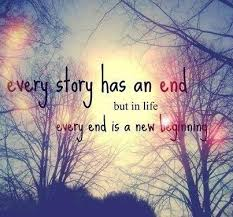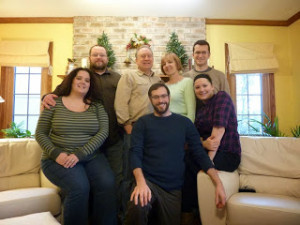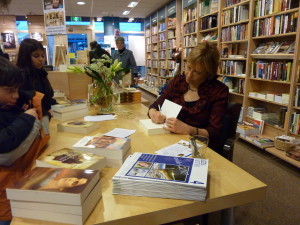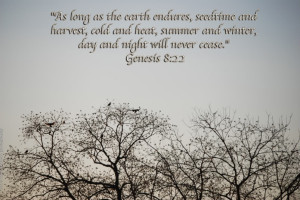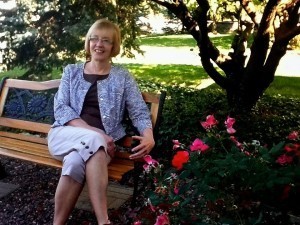Lynn Austin's Blog, page 23
January 6, 2014
The Beginning
 “In the beginning, God created the heavens and the earth. Now the earth was formless and empty, darkness was over the surface of the deep…” (Genesis 1:1)
“In the beginning, God created the heavens and the earth. Now the earth was formless and empty, darkness was over the surface of the deep…” (Genesis 1:1)
I love new beginnings, like the beginning of this New Year, 2014. Of course I have unfinished projects and unanswered prayers leftover from last year, but there’s something about a new year that makes me excited and hopeful and ready to put past disappointments and failures behind me and start all over again.
 As each new year begins, I return to the book of Genesis and start reading through the Bible once again from start to finish. If I keep up with my daily readings of about 20 minutes each, I will complete the Bible a year from now with Revelation. I will also begin to write my next novel at the start of the year. This next book is called Upon This Foundation, which will tell Nehemiah’s story. The plot and characters come from the Bible of course, but the “fictionalized” part of the story is already forming in my head and I can’t wait to put it down on paper… or in this case, type it on my computer.
As each new year begins, I return to the book of Genesis and start reading through the Bible once again from start to finish. If I keep up with my daily readings of about 20 minutes each, I will complete the Bible a year from now with Revelation. I will also begin to write my next novel at the start of the year. This next book is called Upon This Foundation, which will tell Nehemiah’s story. The plot and characters come from the Bible of course, but the “fictionalized” part of the story is already forming in my head and I can’t wait to put it down on paper… or in this case, type it on my computer.
Beginnings are very important. Good writing advice says that the first words and pages of a novel are very important and must hook the reader like a fish on a line and entice them to continue reading. I’ll try to do that with Nehemiah’s story. And the Bible also begins our salvation story with a great hook: “In the beginning, God created the heavens and the earth.” Makes you want to keep reading, doesn’t it? But a few pages into God’s story, we read of tragedy as sin enters the picture.
 As I begin writing each novel, I always have great plans for it, imagining how the book will take shape and what readers will experience as they read. But somehow, my novels never seem to end up the way I’ve planned them in my mind. They aren’t bad or flawed…they just turn out differently than I expected. Not so with God’s story. From the beginning, He knew how His creation would end, even after sin entered the story—and what a glorious ending it will be: “The kingdom of this world has become the kingdom of our Lord and of His Christ, and He will reign for ever and ever” (Revelation 11:15).
As I begin writing each novel, I always have great plans for it, imagining how the book will take shape and what readers will experience as they read. But somehow, my novels never seem to end up the way I’ve planned them in my mind. They aren’t bad or flawed…they just turn out differently than I expected. Not so with God’s story. From the beginning, He knew how His creation would end, even after sin entered the story—and what a glorious ending it will be: “The kingdom of this world has become the kingdom of our Lord and of His Christ, and He will reign for ever and ever” (Revelation 11:15).
An interesting thing happens during the year that it takes me to finish my novels, and it may explain why the story sometimes deviates from my plan. I become changed along the way. God seems to use the daily events of my life throughout the year, along with my daily Bible readings and the Christian books I study, to challenge me and change me and help me grow spiritually. By the time I complete the first rough draft of my novel, the themes and challenges I’ve faced in my own life seem to be reflected there. If I’ve struggled with forgiveness, for instance, I see a theme of forgiveness emerging. If I’ve resisted change in my own life, my characters seem to encounter a similar problem. The losses I’ve wrestled with become my characters’ wrestling matches as well.
As I embark on a new beginning in 2014, I wonder what new insights I will discover in the pages of Scripture, and what new challenges I will face in my personal life. I already know what some of those challenges will be, since my husband is retiring and we’re moving to a different state, leaving loved ones and friends behind. But no matter what this year may bring, I’m comforted to know that not only will God always be a constant in my life, leading and guiding me, but He already knows the ending:
“There will be no more night. They will not need the light of a lamp or the light of the sun, for the Lord God will give them light. And they will reign forever and ever” (Revelation 22:5).
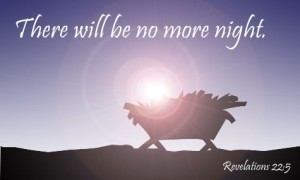
Don’t you love the way God’s story begins with darkness and ends with light? May God bless you as you journey with Him in 2014.
December 16, 2013
Christmas in Bethlehem
 The first time I visited Bethlehem more than 25 years ago, I expected to feel a sense of the beauty and simplicity of the much-loved Christmas story: a crude stable, the holy family, shepherds, wise men, and the Son of God in the manger. I was sadly disappointed. The traditional site of Jesus’ birth in Bethlehem is inside the Church of the Nativity—a truly ancient church built in 565 AD. It has survived enemy invasions, the Crusaders, restorations, renovations, a fire and an earthquake, but it looks like . . . well, a church. A beautifully decorated and ornamented church, with all the sacred clutter that has accumulated over the centuries, but it bore no resemblance to my image of what Jesus’ birthplace was like.
The first time I visited Bethlehem more than 25 years ago, I expected to feel a sense of the beauty and simplicity of the much-loved Christmas story: a crude stable, the holy family, shepherds, wise men, and the Son of God in the manger. I was sadly disappointed. The traditional site of Jesus’ birth in Bethlehem is inside the Church of the Nativity—a truly ancient church built in 565 AD. It has survived enemy invasions, the Crusaders, restorations, renovations, a fire and an earthquake, but it looks like . . . well, a church. A beautifully decorated and ornamented church, with all the sacred clutter that has accumulated over the centuries, but it bore no resemblance to my image of what Jesus’ birthplace was like.
 But wait—the real site was down a set of stairs and inside a natural cave that has been venerated as the place of His birth since 160 AD. But even this simple cave was so gilded and bedecked with artwork and tapestries and lamps and incense burners that I still couldn’t get a sense of what it might have looked like on that first holy night. In the center of the floor was a silver-encrusted star with a hole in the middle. By putting my hand inside, I could touch the place where Jesus was born more than 2,000 years ago. I tried it, but I left Bethlehem feeling empty, unable to make the sacred connection I had so longed for.
But wait—the real site was down a set of stairs and inside a natural cave that has been venerated as the place of His birth since 160 AD. But even this simple cave was so gilded and bedecked with artwork and tapestries and lamps and incense burners that I still couldn’t get a sense of what it might have looked like on that first holy night. In the center of the floor was a silver-encrusted star with a hole in the middle. By putting my hand inside, I could touch the place where Jesus was born more than 2,000 years ago. I tried it, but I left Bethlehem feeling empty, unable to make the sacred connection I had so longed for.
 And isn’t that how so many of our Christmases end up feeling? In spite of all the tinsel and glitter and sparkle, all the money we spend and the stress we endure as we try to create the perfect Hallmark Christmas, we’re often left with the same let-down feeling I had inside that church in Bethlehem. We’ve lost the simple beauty of the story, that precious connection with God that is the true miracle of Bethlehem.
And isn’t that how so many of our Christmases end up feeling? In spite of all the tinsel and glitter and sparkle, all the money we spend and the stress we endure as we try to create the perfect Hallmark Christmas, we’re often left with the same let-down feeling I had inside that church in Bethlehem. We’ve lost the simple beauty of the story, that precious connection with God that is the true miracle of Bethlehem.
The year after visiting Bethlehem, I began looking for ways to recapture the simplicity of Christ’s incarnation. Santa Claus has never been invited to our family Christmases, and we’ve always celebrated it as Jesus’ birthday, exchanging presents because God gave us the gift of His Son. But year after year, the clutter and glitz had draped themselves over our celebrations, just like the religious trappings that have collected inside the Church of the Nativity over the centuries. That year, I purchased a nice but inexpensive manger set. I wanted something that wasn’t a toy, but that my children could handle and touch. We placed it at their level and at the center of our holiday, and began the simple tradition of gathering together as a family to fill the empty stable while my husband read the story from the Bible. Our children divided all the people and sheep and camels among themselves and when we got to their part in the Bible story, they added their figures to the stable. 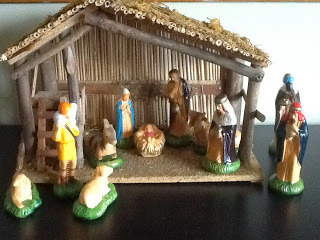
This simple tradition has become so beloved by all of us that we still do it the same way every year, even though our children are now adults. Our two married children couldn’t wait to share the tradition with their spouses, generously dividing their sheep and wise men among the newest members of our family. One year, our daughter was living overseas and couldn’t make it home for the holiday but we still held our family tradition while she participated via Skype and a web camera.
And it’s always in those moments, with this simple stable and inexpensive plaster figures and my precious loved ones gathered around me that I feel the holy wonder of Christmas once again—Emmanuel, God with us!
December 2, 2013
The End
The End. How can two little words—a total six letters—be so exhilarating and yet so terrifying at the same time? After a year of work, I am about to type them at the end of my latest manuscript, 450 typewritten-pages long and 133, 516 words. “The End” will make it 133,518 words. I have typed The End twenty-three times in the past 29 years at the end of each of my books. Each time, it has been just as exhilarating—and just as terrifying.
How does a writer know when a book is really finished? That’s what makes it so scar y—I’m never completely sure. Did I leave something out? Is there a loose end I missed? Should I have ended it differently? Of course by now I have re-written and revised this manuscript a dozen times, but the nagging worry that it isn’t finished never seems to go away. Maybe I could have made it just a little better with a little more time and a little more work.
y—I’m never completely sure. Did I leave something out? Is there a loose end I missed? Should I have ended it differently? Of course by now I have re-written and revised this manuscript a dozen times, but the nagging worry that it isn’t finished never seems to go away. Maybe I could have made it just a little better with a little more time and a little more work.
Typing The End means it’s time to send it to my editor, who will be the judge of whether or not it’s really finished. And that’s another thing that’s scary—once I type The End, the manuscript gets sent out into the world to be judged and reviewed and rated and read by countless other people. For me, that’s as worrisome as sending my first child off to kindergarten.
But typing those two little words is also exhilarating. They mean I’m finished! I don’t need to sit in my office and work all day and sometimes every evening. I’m done! The End! In most other occupations I’ve had, the work was never done. As soon as one class of students moved on to the next grade, another class quickly filled their seats. As an administrative assistant, my in-box never emptied. As a waitress, the tables filled with more customers as quickly as I cleared them off. And don’t even get me started on housework and laundry and cooking being unending! But a book can be finished. Done. Complete. The story that once existed only in my imagination can finally be read and enjoyed by other people. I can hold the book in my hand and see the tangible product of all my hard work. Exhilarating!
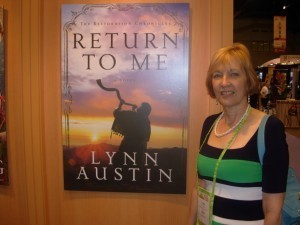 Now I can begin my next task of creating new characters and a new setting, devising new plots and happily-ever-afters. I already know that next I’ll be writing book three in The Restoration Chronicles, based on the biblical books of Ezra and Nehemiah. Book one, Return to Me, was just released this fall. The book I just finished, Keepers of the Covenant, will be out in 2014. Soon I’ll begin book three, On This Foundation. But I won’t start writing yet. I’ll give myself a little holiday over the holidays first.
Now I can begin my next task of creating new characters and a new setting, devising new plots and happily-ever-afters. I already know that next I’ll be writing book three in The Restoration Chronicles, based on the biblical books of Ezra and Nehemiah. Book one, Return to Me, was just released this fall. The book I just finished, Keepers of the Covenant, will be out in 2014. Soon I’ll begin book three, On This Foundation. But I won’t start writing yet. I’ll give myself a little holiday over the holidays first.
As I type The End and complete this book, a huge chapter in my personal life is also coming to The End. My husband Ken has just announced his retirement from his job as a college music professor after 22 years. Our three children grew to adulthood during that time. I wrote nearly all of my books during those years. And now this passage in our life will end and a new one will begin.
Ken and I spent many hours making this decision, taking it as seriously as all of the other decisions we’ve made at other turning points in our life together, such as when to get married, and where to live; the decision to move to South America and to move back to the U.S. two years later; the decision to start a family; to move to Canada and then to return to the U.S. eleven years later; and the decision to accept the job at this college 22 years ago.
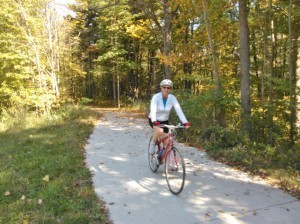 I won’t retire from writing for many more years, God willing. But we’ve decided to move to a smaller house in a less-congested city, in a state where we can enjoy a more relaxed lifestyle and indulge our love of bicycling and nature. We’ve already begun the task of sorting through our possessions as we downsize and get ready for this new beginning. I’m excited—and scared.
I won’t retire from writing for many more years, God willing. But we’ve decided to move to a smaller house in a less-congested city, in a state where we can enjoy a more relaxed lifestyle and indulge our love of bicycling and nature. We’ve already begun the task of sorting through our possessions as we downsize and get ready for this new beginning. I’m excited—and scared.
We’ve reached The End of a huge chapter in our life. And like finishing another manuscript, I find the process both terrifying—and exhilarating. Because sometimes The End is just the beginning.
November 18, 2013
Thanksgiving Traditions
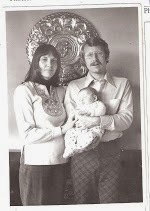
Our son Josh was born in Columbia
The first Thanksgiving I ever celebrated away from home was 40 years ago when my husband and I lived in Bogota, Colombia. We had moved there after Ken won a position as principal trumpeter with the National Symphony Orchestra and I got a job teaching in a private Colombian school. We weren’t the only Americans who were far from home for the holiday, so we decided to host a traditional Thanksgiving dinner for the American musicians and teachers from my school.
This was my first solo holiday meal, and I wanted to get everything right. I asked everyone to give me their favorite Thanksgiving recipe—“like Mom used to make”—then I went on a scavenger hunt all over the city for the ingredients. We had to order the turkey from friends of ours who worked in the U.S. Embassy since turkeys weren’t available in Colombia.

Bogota, Columbia
The day before Thanksgiving, I was hard at work in our tiny kitchen with our Colombian maid, Cecelia, who was intrigued by this “gigantic chicken.” I decided to remove the giblets and turkey neck from the cavity where the stuffing would go, and I gingerly reached inside as I had seen my grandmother do year after year. But I had a surprise waiting for me inside. I pulled out . . . turkey feet! A pair of them, with gnarly claws, wrinkly skin, and disgusting turkey toes! I did what every shocked, novice cook would do—I let out a scream and dropped the gross-looking things! Cecelia caught them before they even hit the ground.
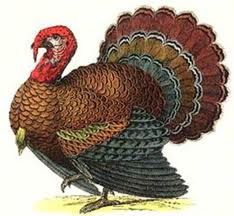 “Senora Lynn? What’s wrong?” she asked me in Spanish.
“Senora Lynn? What’s wrong?” she asked me in Spanish.
“They’re…they’re FEET!” I replied. There weren’t enough words in my Spanish vocabulary to convey my horror and revulsion.
“You don’t want them?” she asked—as if I was about to throw away a week’s pay.
“NO! I certainly don’t!”
May I have them?” she asked shyly. I gave them to her with my blessings, and returned to my search for the giblets. This time I pulled out an even bigger surprise—the entire turkey head! It had beady little eyes, and a pointy beak, and that horrible wobbly thing on its head! This time I screamed so loudly that one of our neighbors rushed to our door.
Have you ever seen a turkey up close? They have to be one of the ugliest birds in the world, and believe me the head is even more horrible when it’s severed from the body! Once again, I dropped it. And once again, Cecelia caught it before it hit the ground. She cradled it in awe. Her expression was that of a woman who has just won the lottery.
“Yes! Take it, take it!” I told her. “Just get it out of here!”
“Oh, Senora Lynn, thank you . . . thank you!” As they say, one woman’s trash is another woman’s treasure. I put the turkey in the refrigerator, too grossed out to look for the giblets.
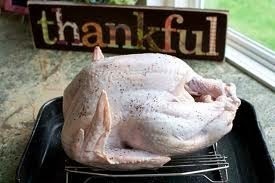 That wasn’t my only surprise that year. The next morning, Ken got up early with me to help stuff the bird and put it into the oven. (I let him look for the giblets.) We had already learned that food takes longer to cook in Bogota, which sits at an altitude of 8,600 feet, and we wanted to make sure the bird was fully cooked. Now, I had never actually used the oven in our apartment because our building had been without gas ever since we’d moved in a few months earlier. But the gas had recently been turned on and I was excited to be able to expand my cooking repertoire beyond what I could create with a tiny electric toaster oven and a hot plate.
That wasn’t my only surprise that year. The next morning, Ken got up early with me to help stuff the bird and put it into the oven. (I let him look for the giblets.) We had already learned that food takes longer to cook in Bogota, which sits at an altitude of 8,600 feet, and we wanted to make sure the bird was fully cooked. Now, I had never actually used the oven in our apartment because our building had been without gas ever since we’d moved in a few months earlier. But the gas had recently been turned on and I was excited to be able to expand my cooking repertoire beyond what I could create with a tiny electric toaster oven and a hot plate.
The twenty-two pound turkey was prepped and ready to go, but when I opened the oven door—surprise!—the inside was the size of a shoe box! I had never even thought to look inside since the oven door was normal-sized. I did what any first-time Thanksgiving cook with guests coming in a few hours would do—I sat down on the kitchen floor and cried.
“Maybe we can cut the turkey into chunks,” Ken suggested, “and roast it piece by piece.” I cried even harder. Who ever heard of carving up a raw turkey? Besides, the pumpkin pie had to bake inside that stupid oven, too.
 Ken left me in my misery and went next door to use the neighbor’s telephone. (We weren’t lucky enough to have one.) He called our friends who were coming for the meal and said, “Hey, would you mind measuring your oven?” It turned out that theirs was big enough, so Ken wrapped up the bird and loaded it into a taxi (we didn’t have a car, either) and rode across town with it to our friends’ apartment. When the turkey was done roasting several hours later, our friends delivered the steaming hot turkey back across town in another taxi. And it tasted delicious.
Ken left me in my misery and went next door to use the neighbor’s telephone. (We weren’t lucky enough to have one.) He called our friends who were coming for the meal and said, “Hey, would you mind measuring your oven?” It turned out that theirs was big enough, so Ken wrapped up the bird and loaded it into a taxi (we didn’t have a car, either) and rode across town with it to our friends’ apartment. When the turkey was done roasting several hours later, our friends delivered the steaming hot turkey back across town in another taxi. And it tasted delicious.
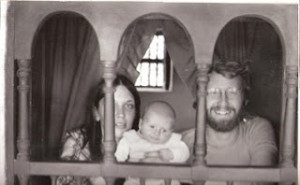 Each year, Ken and I have fun recalling that Thanksgiving as we prepare for the holiday. For me, the best part of the meal isn’t the food but the chance to sit down with friends and family and thank God for all of the many blessings He has showered on us. This year, I’m blessed to have all three of my children and their spouses home for Thanksgiving. But ever since that first special dinner in Bogota, it has also been our family tradition to invite guests who are far from home to join us for the holiday.
Each year, Ken and I have fun recalling that Thanksgiving as we prepare for the holiday. For me, the best part of the meal isn’t the food but the chance to sit down with friends and family and thank God for all of the many blessings He has showered on us. This year, I’m blessed to have all three of my children and their spouses home for Thanksgiving. But ever since that first special dinner in Bogota, it has also been our family tradition to invite guests who are far from home to join us for the holiday.
Oh, and one more tradition—it’s Ken’s job to reach inside the turkey every year.
November 4, 2013
Chasing Success
(I shared these thoughts as a guest on the Seekerville blog for writers on October 26 and thought you might enjoy reading them here)
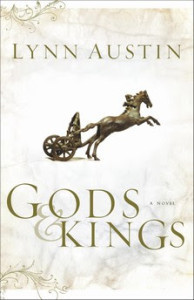 When I first began writing, my only goal for nearly eleven years was to get published. If I could just hold my own book in my hand and see my name on the cover, I would know I was a successful writer. When that glorious day finally arrived however, it didn’t seem to satisfy me the way I had hoped it would. I still didn’t feel like a real writer. What was missing?
When I first began writing, my only goal for nearly eleven years was to get published. If I could just hold my own book in my hand and see my name on the cover, I would know I was a successful writer. When that glorious day finally arrived however, it didn’t seem to satisfy me the way I had hoped it would. I still didn’t feel like a real writer. What was missing?
I needed a book signing! Successful writers had them, didn’t they? I made the rounds of several local bookstores and managed to arrange a signing at one of the BIG ones. My family and a handful of friends from church were kind enough to show up, but the general public seemed annoyed that I was talking while they were browsing through the real books. My second book signing at a Christian bookstore seemed more promising since it coincided with their grand re-opening at a new and larger location. But I wasn’t the only celebrity that day. I shared the spotlight with a famous red tomato, and my table near the front door turned out to be a convenient place for parents with small children to stop and ask for directions to the real attraction. No risk of getting writer’s cramp signing four books.
When my first royalty statement arrived, I was sure I would finally feel like a success. But the dismal numbers told me that my books were sitting in a warehouse, not in readers’ hands. Hardly a sign of success. A few more years passed in which I gradually sold more and more books but I still struggled to feel like a real writer. Then my publisher invited me to promote my books at the International Christian Retail Show. This, I learned, was a really big deal in Christian publishing. Authors get to sit in “personality booths” for thirty minutes signing huge stacks of books. Sometimes the lines of eager bookstore owners stretched across the convention floor. At last, I would feel like a success! But it turned out that there were several “personalities” occupying several booths, all signing at the same time as me—and of course the lines for the Big-Name authors were much longer than mine. In fact, most of the people who stopped by for my autograph asked me not to personalize their books. I found out later that they intended to sell these free copies in their bookstores to help pay for their trip to the convention. My signature wasn’t going to be one of their cherished possessions.
It was hard not to become envious while at the convention. The shuttle buses from the hotels to the convention center featured bus-sized pictures of celebrity authors and their latest books on the sides. Book trailers played on TV screens during the bus rides, advertising other famous authors’ books. (Why didn’t I have a book trailer?) Everywhere I looked the advertisements and promotions and handouts seemed bigger and brighter and flashier than mine. I left the convention feeling even less like an author than before. When would I be as successful as everyone else?
The bestseller list! That was the true mark of a successful writer, wasn’t it? How could I claw my way to the top of that? A place in the Top Ten became my benchmark for a while, and when I finally did get on the Christian Bookseller Association’s list I discovered that the mark of a real writer was the New York Times’ bestseller list. Oh, well. Still not there.
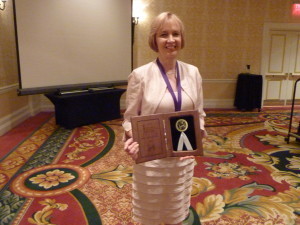 One wonderful day I learned that my book had been nominated for a Christy Award. What an honor! I went out and bought copies of the two other books that were finalists in my category, and of course, both were better than mine. I was envious and certain that I wouldn’t win. But I did! So, was I success now? Would eventually winning eight Christy Awards and being inducted into the Christy Hall of Fame do it? My royalty checks had more zeros in them than ever before, and I received wonderful letters and emails from readers—marks of a true writer, right? But there were always other authors who had larger royalty checks and sacks full of mail arriving in their in-boxes.
One wonderful day I learned that my book had been nominated for a Christy Award. What an honor! I went out and bought copies of the two other books that were finalists in my category, and of course, both were better than mine. I was envious and certain that I wouldn’t win. But I did! So, was I success now? Would eventually winning eight Christy Awards and being inducted into the Christy Hall of Fame do it? My royalty checks had more zeros in them than ever before, and I received wonderful letters and emails from readers—marks of a true writer, right? But there were always other authors who had larger royalty checks and sacks full of mail arriving in their in-boxes.
Somewhere along the way, I realized that I was like a greyhound on a racetrack, chasing a man-made rabbit that I had no hope of catching. It was time to stop the craziness and the envying and the yearning for more, and clearly define “success” for myself. Otherwise, each achievement would fail to satisfy because someone else would always be higher on the bestseller list or have a bigger picture on the side of the bus or longer lines at their signings or a flashier book trailer (I’ve still never had a book trailer.) In my morning quiet times, I asked God to show me the answer . . . What was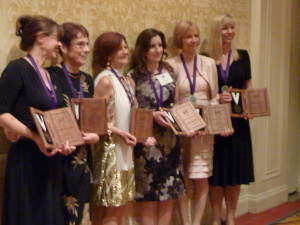 the true indicator of success as a Christian writer? And little by little I began to see that success in God’s eyes looks very different from man’s measures. Jesus, by His life and death and resurrection, showed us that success is defined as obedience to God’s call. It’s as simple as that. Was I obeying God and giving all my heart and soul and strength to His purposes for my life?
the true indicator of success as a Christian writer? And little by little I began to see that success in God’s eyes looks very different from man’s measures. Jesus, by His life and death and resurrection, showed us that success is defined as obedience to God’s call. It’s as simple as that. Was I obeying God and giving all my heart and soul and strength to His purposes for my life?
Numbers don’t count for much in God’s eyes—people do. He sent Philip on a long, hot desert journey just to touch one Ethiopian eunuch’s heart. God would think it was nothing at all to ask me to labor for hours to write a novel in order to bless one lonely, hurting, struggling reader. I would be a success in His eyes if I obeyed His calling and accomplished His purposes even if I never saw tangible proof of the results. If a novel that sold only 1,000 copies and never made it to anyone’s bestseller list was used by God to change one life, would it be a success? Absolutely!
 I’ve finally re-defined success for myself, after 21 published books. I now consider myself in the same line of work as a missionary, willing to work hard and serve God wherever He chooses to send me. People don’t become missionaries to be rich and famous or to have their pictures plastered on the sides of buses. They don’t measure the success of their ministry by the size of the church or the number of converts or the amount of money they’ve collected. Instead, they simply choose to obey God and then make the necessary sacrifices in order to answer His call. They do the work, trust Him to provide for their daily needs, and then leave the results in His hands. If I do the same things with my writing, I will be a success. Sure, the awards and bestseller lists are nice but these are no longer goals for me. (And honestly, do I really want to see a larger-than-life-sized photograph of myself cruising through the city streets?) I can’t compare myself with other writers because I can’t see the behind-the-scenes work that God is doing with their books as readers’ lives are changed. My greatest rewards aren’t royalty checks and trophies (although I’ll admit they’re nice). My rewards are letters like the one I received from a reader the other day saying, “Thank you for showing me the way back to God.”
I’ve finally re-defined success for myself, after 21 published books. I now consider myself in the same line of work as a missionary, willing to work hard and serve God wherever He chooses to send me. People don’t become missionaries to be rich and famous or to have their pictures plastered on the sides of buses. They don’t measure the success of their ministry by the size of the church or the number of converts or the amount of money they’ve collected. Instead, they simply choose to obey God and then make the necessary sacrifices in order to answer His call. They do the work, trust Him to provide for their daily needs, and then leave the results in His hands. If I do the same things with my writing, I will be a success. Sure, the awards and bestseller lists are nice but these are no longer goals for me. (And honestly, do I really want to see a larger-than-life-sized photograph of myself cruising through the city streets?) I can’t compare myself with other writers because I can’t see the behind-the-scenes work that God is doing with their books as readers’ lives are changed. My greatest rewards aren’t royalty checks and trophies (although I’ll admit they’re nice). My rewards are letters like the one I received from a reader the other day saying, “Thank you for showing me the way back to God.”
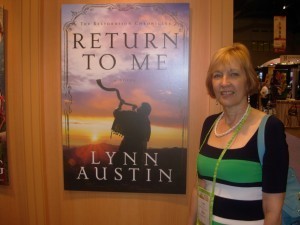 My advice for aspiring writers is to make sure you define success for yourself, early in your career. Once you define it, you’ll be able to outline the steps you need to take in order to accomplish that goal—and you’ll be able to congratulate yourself when you reach it. You will finally feel like a success. But for me, no other reward will ever compete with the satisfaction of knowing that I’m serving God and touching lives for His glory, not my own.
My advice for aspiring writers is to make sure you define success for yourself, early in your career. Once you define it, you’ll be able to outline the steps you need to take in order to accomplish that goal—and you’ll be able to congratulate yourself when you reach it. You will finally feel like a success. But for me, no other reward will ever compete with the satisfaction of knowing that I’m serving God and touching lives for His glory, not my own.
October 25, 2013
Woman Alive Magazine
Thank you to Woman Alive Magazine for featuring me in December’s issue!
 Check it out and enter a review for a chance to win their book of the month, “Pilgrimage”
Check it out and enter a review for a chance to win their book of the month, “Pilgrimage”
Enjoy the interview here:
October 21, 2013
Autumn
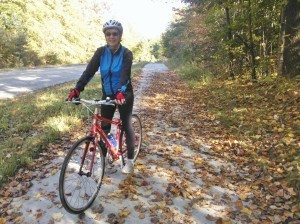 Last Friday and Saturday, I got to do one of my very favorite things. My husband and I spent two beautiful autumn days together, riding our bicycles in Michigan. The trees’ changing colors were magnificent. The leaves made a glorious rustling sound beneath our bike tires. We rode twenty miles each day along wooded trails, through a patchwork of farm land, and out to a lighthouse on Lake Michigan where the wind blew the indigo water into restless waves. We stopped to eat freshly-picked apples that were crunchy and sweet. The air smelled of leaves and sunshine and bonfires.
Last Friday and Saturday, I got to do one of my very favorite things. My husband and I spent two beautiful autumn days together, riding our bicycles in Michigan. The trees’ changing colors were magnificent. The leaves made a glorious rustling sound beneath our bike tires. We rode twenty miles each day along wooded trails, through a patchwork of farm land, and out to a lighthouse on Lake Michigan where the wind blew the indigo water into restless waves. We stopped to eat freshly-picked apples that were crunchy and sweet. The air smelled of leaves and sunshine and bonfires.
Each time the seasons change, I think of God’s promise after the flood:
In other words, life brings change. I should be used to it by now—yet I resist.
 Fall used to be my favorite time of year. Then I lived in Canada for eleven years where the season lasted only two weeks—maybe three, if we were lucky. My children thought that going trick-or-treating in the snow was normal. As soon as I saw the leaves begin to change I would panic, knowing that the long, long winter and minus 40 degree temperatures would quickly follow. Maybe that’s why I’ve felt a bit panicked lately when I look in the mirror and realize that I’ve entered the fall season of my life. How many more years will I enjoy riding my bicycle? And more importantly, how many more productive writing years will I have?
Fall used to be my favorite time of year. Then I lived in Canada for eleven years where the season lasted only two weeks—maybe three, if we were lucky. My children thought that going trick-or-treating in the snow was normal. As soon as I saw the leaves begin to change I would panic, knowing that the long, long winter and minus 40 degree temperatures would quickly follow. Maybe that’s why I’ve felt a bit panicked lately when I look in the mirror and realize that I’ve entered the fall season of my life. How many more years will I enjoy riding my bicycle? And more importantly, how many more productive writing years will I have?
Shortly before our weekend biking trip, I read this comforting scripture from Psalm 92: “The righteous . . . will still bear fruit in old age, they will stay fresh and green…” What a glorious promise! I can savor this time in my life just as I savored the sights and sounds and smells on our autumn biking trip, knowing that my fruit-bearing years are far from over. This season of my life can have a special beauty all its own.
old age, they will stay fresh and green…” What a glorious promise! I can savor this time in my life just as I savored the sights and sounds and smells on our autumn biking trip, knowing that my fruit-bearing years are far from over. This season of my life can have a special beauty all its own.
 And as if to prove it, my husband and I arrived home—tired but happy, bearing piles of sweaty clothes, sneakers full of sand, and several baskets of apples—and there in the mailbox was the first copy of my newest book. It begins another change for me—this is my very first non-fiction book. It’s called Pilgrimage; My Journey to a Deeper Faith in the Land Where Jesus Walked. Ironically, the book chronicles some of the changes in my life, and tells about the lessons I’ve learned through those changes.
And as if to prove it, my husband and I arrived home—tired but happy, bearing piles of sweaty clothes, sneakers full of sand, and several baskets of apples—and there in the mailbox was the first copy of my newest book. It begins another change for me—this is my very first non-fiction book. It’s called Pilgrimage; My Journey to a Deeper Faith in the Land Where Jesus Walked. Ironically, the book chronicles some of the changes in my life, and tells about the lessons I’ve learned through those changes.
We live in the American Midwest now, and I no longer panic when I see the leaves changing colors. I know that the season will last much longer than two weeks. I may even get a chance to ride my bicycle in shorts in the middle of October. And if my newest book is any proof, even in the autumn of my life, God promises to make me fruitful.
October 7, 2013
Serving Like Jesus
Imagine your entire church congregation going on a mission trip together—men and women of all ages from senior citizens to small children. That’s what more two hundred people from my church body did last weekend, and it was amazing! Serving on a mission trip has long been on my “bucket list” but time and financial constraints never allowed it—until now. Where did we go? Not to a far flung, exotic locale, but to a place where our help was needed just as badly: our own community.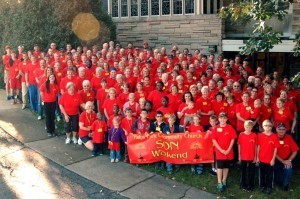
The idea for a church-wide mission trip began nearly five years ago in the middle of the recession when our congregation asked the question, how can we follow Christ’s command to demonstrate love and to serve as He did? “I am among you as one who serves,” Jesus said, and He put His words into actions by washing His disciples’ feet, one of the lowliest, unsung menial tasks there is. We decided to serve the people in our own community who had fallen on hard times—and the idea for S.O.N. Weekend—Serving Our Neighbors—was born.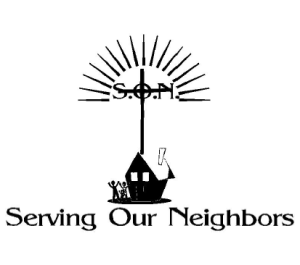 Our leadership team worked with the local director of Social Services, compiling a list of more than twenty needy families, many of them senior citizens, who needed a compassionate, helping hand. We did little jobs such as painting and house cleaning and yard work, fixing leaking faucets and ceiling fans, cleaning gutters and doing general household repairs. And we tackled bigger jobs, supervised by the experts in our congregation, such as repairing roofs, installing replacement windows, and building a wheelchair ramp. Children from our congregation worked alongside their parents, and it’s been wonderful to see that our teens and young people are always among the most enthusiastic workers, and the first to volunteer. They’ve discovered the joy of giving, expecting nothing in return.
Our leadership team worked with the local director of Social Services, compiling a list of more than twenty needy families, many of them senior citizens, who needed a compassionate, helping hand. We did little jobs such as painting and house cleaning and yard work, fixing leaking faucets and ceiling fans, cleaning gutters and doing general household repairs. And we tackled bigger jobs, supervised by the experts in our congregation, such as repairing roofs, installing replacement windows, and building a wheelchair ramp. Children from our congregation worked alongside their parents, and it’s been wonderful to see that our teens and young people are always among the most enthusiastic workers, and the first to volunteer. They’ve discovered the joy of giving, expecting nothing in return.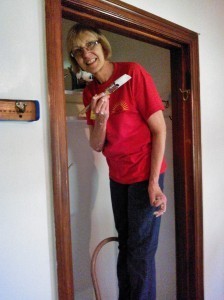 Of course, not everyone in our multi-generational congregation can do this kind of physical labor but there is still a job for everyone. Members are needed to prepare a light meal for us on Friday night, to make and deliver lunches to all the work crews on Saturday, and to prepare breakfast for the congregation and our guests on Sunday. Other members are part of the care-giving teams who spend Saturday visiting with the people we serve and praying with them. Still others take care of the youngest children in the nursery so their parents can serve. Even home-bound members join in by praying for S.O.N. Weekend activities, donating money for expenses, and creating these beautiful gift baskets that went to each homeowner we served.
Of course, not everyone in our multi-generational congregation can do this kind of physical labor but there is still a job for everyone. Members are needed to prepare a light meal for us on Friday night, to make and deliver lunches to all the work crews on Saturday, and to prepare breakfast for the congregation and our guests on Sunday. Other members are part of the care-giving teams who spend Saturday visiting with the people we serve and praying with them. Still others take care of the youngest children in the nursery so their parents can serve. Even home-bound members join in by praying for S.O.N. Weekend activities, donating money for expenses, and creating these beautiful gift baskets that went to each homeowner we served.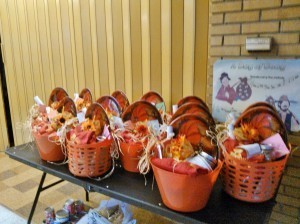 Last Saturday was our fourth S.O.N. Weekend, and to be honest, I think our congregation has been blessed even more than the people we’ve helped. It has drawn us together as one family and given us the opportunity to work side-by-side with each other in ways that bring glory to Christ. On the Sunday morning after our workday, we gathered together in Fellowship Hall, all wearing our red T-shirts, to treat the families we served to breakfast before our morning worship service. Several of our guests took the opportunity to thank us and to share their reactions to being helped. One of them said, “I live alone and I thought God had forgotten me, that He no longer cared about me. But then your church came and I was overwhelmed to see that He really did love me after all. He sent His angels to be His hands and feet.”
Last Saturday was our fourth S.O.N. Weekend, and to be honest, I think our congregation has been blessed even more than the people we’ve helped. It has drawn us together as one family and given us the opportunity to work side-by-side with each other in ways that bring glory to Christ. On the Sunday morning after our workday, we gathered together in Fellowship Hall, all wearing our red T-shirts, to treat the families we served to breakfast before our morning worship service. Several of our guests took the opportunity to thank us and to share their reactions to being helped. One of them said, “I live alone and I thought God had forgotten me, that He no longer cared about me. But then your church came and I was overwhelmed to see that He really did love me after all. He sent His angels to be His hands and feet.”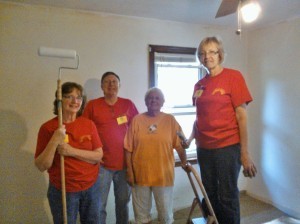 That’s the greatest part of S.O.N. Weekend to me—that we, His humble servants who scrub floors and bathrooms on our knees, who paint rooms and wash windows and rake leaves, who climb ladders to clean gutters and fix leaky roofs, don’t do this work for our own glory. Those we serve get to see Christ in all of us, and all of the praise and glory goes to God.
That’s the greatest part of S.O.N. Weekend to me—that we, His humble servants who scrub floors and bathrooms on our knees, who paint rooms and wash windows and rake leaves, who climb ladders to clean gutters and fix leaky roofs, don’t do this work for our own glory. Those we serve get to see Christ in all of us, and all of the praise and glory goes to God.
October 3, 2013
Visit me in my Garden & Hear the Story behind the Story
Come visit me in my Garden! http://novelgarden.blogspot.com/2007/08/lynn-austin.html
Come hear the Story behind my newest book, “Return to Me”
http://litfusegroup.com/blog/the-story-behind-return-to-me
Don’t forget to visit Author Buzz for a chance to WIN one of five signed copies of RETURN TO ME!
Facebook Party and Giveaway!!
 Travel back in time with me to the Old Testament! Grab your copy of “Return to Me” and join me for an author chat party on October 22nd at 8:00 PM EDT (that’s 7:00 Central,
Travel back in time with me to the Old Testament! Grab your copy of “Return to Me” and join me for an author chat party on October 22nd at 8:00 PM EDT (that’s 7:00 Central, 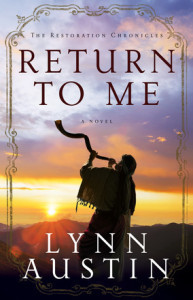 6:00 Mountain, & 5:00 Pacific)!
6:00 Mountain, & 5:00 Pacific)!
Click JOIN to RSVP and then come back to this page on the 22nc (I’ll send you a reminder!) and follow the link to the party page.
During the party I’ll be hosting a book chat, testing your trivia skills, and announcing the winner from the Kindle Fire giveaway (enter here: http://bit.ly/15NM3G3), and of course, there will be plenty of fun giveaways, too: books, gift certificates, and more!
Know somebody who loves to read or loves biblical history? Bring your friends! Just share the link to this page or click INVITE FRIENDS.
I ALMOST FORGOT!! I’ll also be giving you an exclusive look at the next book in the series!
To see what others are saying about “Return to Me,” visit the blog tour: (http://litfusegroup.com/author/laustin)
General entry link: http://litfusegroup.com/lynn-austin-return-to-me (This link is for folks who don’t want enter via Facebook or don’t have FB accounts.)


